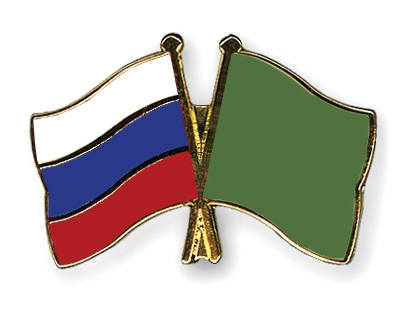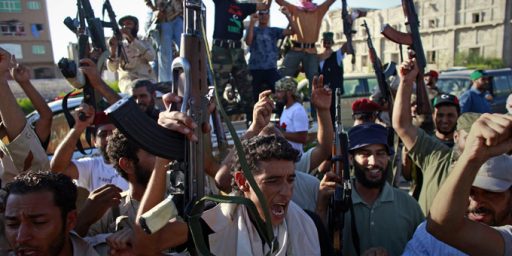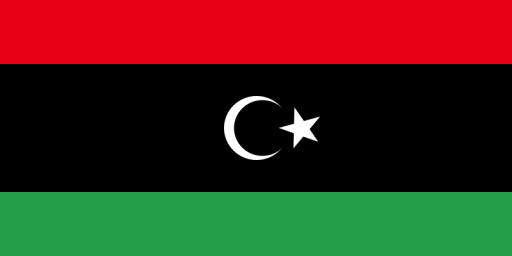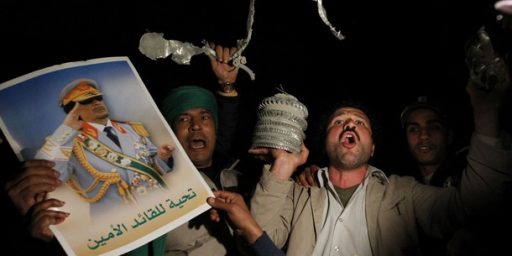A Russian Looks at the War in Libya
A take on the conflict that's probably different from the one you've been reading.
I wanted to draw your attention to an article by Anatoly Tsyganok, director of the Center for Military Forecasting in Russia, on the war in Libya. The Russian language original is here. Its appearance in RIA Novosti, the state-owned news agency, suggests it has a certain amount of official sanction. The article includes a summary of the situation to date, some description of the weapons that NATO has used, and NATO shortcomings the action has revealed. The quotes below are from the official English translation which I found a bit clunky.
The situation:
NATO’s military operation against Libya, conducted mainly by the armed forces of the US, France and Britain, is speeding up the formation of a new system of international relations. At the same time the war serves as a firing ground for testing the strategy of the United States Africa Command (USAFRICOM) in real combat situation as well as the efficiency of new weapons …
US and NATO strategists were wrong counting that the military campaign would be completed in several weeks. Under resolution № 1973 of the UN Security Council, no-fly zone over the air space of Libyan Arab Jamahiriya was created, embargo on weapon supplies was introduced and the Libyan assets were frozen. The operation in Libya which was initially to be completed by June 27 was prolonged by 90 days till the end of September.
There have been reports in mass media that a wide-scale ground operation in Libya under the US command is being planned and the troops are expected to be deployed there by October. The Libyan war is the fifth in addition to four wars the US is conducting in Iraq, Afghanistan Pakistan and Yemen… The goals of the US permanent presence in Libya are to punish Gaddafi for his refusal to join USAFRICOM, to drive the Chinese away from Libya and to cut the access to oil resources for Europeans.
If the U. S. begins ground operations in Libya I will be greatly surprised. Flabbergasted. I think it’s far more likely that we will cease our air operations in Libya without a decisive conclusion than that we will begin ground operations there. I am further skeptical of his third speculative objective (“to cut the access to oil resources for Europeans”). I think that it’s more likely that the objective is to give France and, possibly, Italy a leg up on relations with a future Libyan government with possible increased influence on Libyan oil trade than it is to cut European access to that trade.
NATO shortcomings:
150 days of war have revealed the poor state of political and military coordination within NATO. France, which initiated the military operation, could do nothing with Gaddafi without US noise jammers, fuel tankers, AEW planes and cruise missiles. In order to employ dozens of their Tornado bomb fighters against Libya Brits had to leave half of their aircraft fleet in England without spare parts and to stop flights of its defensive fighters. The operation in Libya is a localized military conflict and if Europeans have problems with the ammunition already a couple months after the beginning of the campaign it would be reasonable to ask them what kind of war they were preparing for?
There is a very different take on the nature of the civil war than you have probably encountered in the Western media:
But NATO underestimated the moral and psychological state of the Libyan troops. The leadership of the US and NATO supposed that after the first strikes the army of Gaddafi will be defeated and the Libyan soldiers would begin to yield themselves prisoners, but the army of Gaddafi managed to keep its combat effectiveness. The Libyan army in March and the Libyan army in July of 2011 are two different armies in terms of tactics, effectiveness and courage. Those soldiers learn very fast. The task on the liquidation of the Libyan combat power remained unfulfilled. NATO and the US failed to gain full control over the coastline and the Western part of Libya.
Unexpectedly for the Western coalition, most of the population supported Gaddafi. According to mass media, about 70% of citizens of Libya either support their leader or stay neutral. The governmental troops are supported by the units of local defense (a reserve component of the armed forces) and the militia. It means that the leaders of the operation against Libya see the rebel minority not the majority which is loyal to Gaddafi as “peaceful population”.
Estimated costs of the operation:
As of June 3, the US’ expenditure on operation in Libya (only Pentagon related costs) amounted to $715.9 mln. The US servicemen supplied humanitarian aid worth $1 million, while another $1 mln was spent on replenishment of reserves of the US Defense Ministry. By September 30, the Libyan campaign will consume another $400 mln. Storm Shadow and Tomahawk missiles launched from submarines cost $1.1 million and ₤800,000 pounds each.
According to the French Defense Ministry, as of May 3, of total €53 million spent on the United Defender operation €31.7 million ($ 45.1 mln) was spent on the ammunition.
As of May 8, Great Britain’s expenditures on guided high precision weapon amounted ₤43.77 million ($71.8 million).
Sending 4 Tornado GR4 bombers, 3 Europe Typhoon jet fighters and support aircraft costs ₤3.216 million daily. One hour of operation of Tornado plane costs ₤33,000, including fuel, maintenance and crew training. Typhoon costs ₤80,000 per hour. Italy’s Defense Minister Ignazio la Russa announced that his country had reduced costs on participation in the operation in Libya from €142 million to €60 million).
By September 30, that total costs on the operation in Libya are expected to reach $1.1 billion.
The article isn’t long and contains some interesting details that, if they’ve been reported in the American press at all, have been hidden in the back pages. Obviously, I have no ability to vouch for the veracity of any of the facts reported.







We’ll be deploying ground troops solely for purposes of the fiscal savings to be derived from discontinuing the occupation.
i will be absolutely shocked if a large scale ground operation is in the works. they cant be that foolish, right?
While I hope that there is no large scale ground operation, I don’t think it is outside the realm of possibility that plans have been drawn up for that contingency.
IANITM (I am not in the military), but my understanding is that sort of planning happens all the time as part of a day-to-day function of Military Operations. But that doesn’t mean the plans are ever followed through on.
Fully agree about the absurdity of US ground invasion and the oil conspiracy angle. The assessment of NATO’s operations, though, comport with what most of the NATO hands that I’m reading have been saying. Most are dismayed that we’re down to a “NATO” that’s really the US military and a small augmenting force.
Ghaddafi specifically threatened to expel Western oil companies from the country, and by all accounts was preparing to do so. Oil is the primary factor here.
If NATO ever fights a war worth fighting, our allies will be up to the task.
@ponce: I don’t think it works like that in modern warfare. Unless it’s a truly protracted fight, nations, in the sage words of Donald Rumsfeld, “go to war with the army you have—not the army you might want or wish to have at a later time.”
The Europeans mostly have gutted their armed forces and have little way to quickly ramp up.
See also, “Afghanistan and Libya Point NATO to Five Lessons” by former US Ambassador to NATO Kurt Volker.
@Mattb
True enough. The groups that do it generally research and gather a good deal of information in doing so. They come up with not only with different attack plans but what would be needed to accommodate such plans. They consider what is available and what is likely to be available. When it appears likely that those actions will happen, they pass that information and planning to other groups who usually revise them and start putting in place the logistic part of it.
There are more contingency plans out there then you can shake a stick at. It cracks me up when people are shock that we have a plan for such and such. It is called being prepared.
@ponce
Sounds like wishful thinking. If we fight a fight “worth fighting” it is unlikely they we have the time to build up their forces. Therefore we will have to fight with military we have at the time. As of now some non U.S NATO have fine military personnel but as a force as a whole they are very lacking. The others don’t have either.
I doubt the figures on support for Gaddafi, and I doubt the planned ground war.
As for the hollowness of non-US NATO forces I consider this realization to be a great side benefit. I’ve always suspected it was the case. Now the French and British governments have been forced to face the truth: they don’t have serious military forces, certainly not forces appropriate to Western status quo powers with 120 million population (just UK and France.)
What the Russian article avoids talking about is the map. Gaddafi has gone from 100% control to losing the entire east and much of the south and west as well. He lost the battle for Misrata. The sea and air are owned by his enemies. Gaddafi is essentially surrounded, albeit by less-than-US-Marine-standard troops.
The big danger remains as it has been from the start that the rebel forces will fracture along political or tribal lines.
While the critique of NATO co-ordination seems on target, Anatoly’s claim that ” Those soldiers learn very fast. ” is applied to wrong side. It’s the rebels that are improving day-by-day.
G’s force have not staged a successful offensive operation in over three months. In that time, the Rebels have become better organized, have acquired better weapons, and made major advances on all THREE fronts.
Three months ago, the fighting was in Misurata. Today the fighting is in Zliten, 60 km closer to Tripoli. The Port and Airport at Misurata are firmly in rebel hands and being used for resupply.
Three moths ago, the rebels were confined to Ajdabiya. Today the rebels are besieging Brega, 80 km closer to Sirte, after a successful offensive that included a sea-landing.
Three months ago, the Berbers were desperately trying to clear the Wazin border crossing to Tunisia. This week, they took Ghezaia with a well-coordinated three-pronged assault on,. For the first time since the war began the Berbers can resupply from Tunisia without having to drive trucks past Gadafi gunsights.
One can also see how fast the rebels have learned to become soldiers in the news clips. Five months ago one saw small clumps of civilians with AK-47s. Three months ago, “technicals” — AA guns mounted on pickup trucks – appeared in footage from Misurata. This week, the BBC and Al Jazeera showed rebel tanks in action on all three fronts.
Desert warfare proceeds slowly because of the logistical challenges of the immens distances involved.
Even The Desert Fox (Erwin Rommel) needed 14 months to get from Tripoli to El Alamein.
@Tylerh:
Exactly.
People who want for policy, ideological or partisan reasons to attack this effort really avoid the map. The map blows holes in all their favored assumptions. Someone should do an animation showing the shrinking pocket of Gaddafi green. Maybe then they’d take a look at what is, rather than what they wish was.
Unless it is a nuclear exchange, given recent wars, it’s reasonable to conclude any war that actually mattered would be a protracted one.
Plenty of time for our apathetic allies to recruit and train troops.